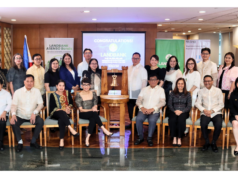Peter Alagos, editor of Central Luzon BusinessWeek, welcomed the participants and introduced Dino Balabo who initially presented a brief background of the citizens’ press council (CPC).
Dino Balabo is the only reporter of Mabuhay News, a weekly newspaper based in Bulacan. He is also the interim chairman of the Central Luzon Press Council.
Balabo’s presentation focused on the establishment of the CLPC which was also presented during the Center for Media Freedom and Responsibility (CMFR – CPC) reunion/consultation on October 25-27, 2008 at AIM Conference Center in Makati City.
He said that the media boom in Pampanga means only one thing – the need to establish a citizens’ press council.
Although a regional press council was already created, he said that a per-province press council would be appropriate and effective as suggested by Atty. Pacheco Seares of Sun Star Cebu.
“Does the press consider itself a business or a government enterprise?” asks Businessman Marc Nepomuceno.
Media practitioners said that most newspapers, TV and radio stations, local and national, mostly operate as business enterprises.
Tonette Orejas of the Philippine Daily Inquirer said newspapers like the PDI and other local newspapers in Pampanga are not under government regulation. “To be regulated by the government is a no-no.”
‘WHERE DO WE START?’
Orejas and Balabo suggested that another meeting should be set with other sectors and possible members. Participants agreed to temporarily use the Cebu Citizens’ Press Council’s (CCPC) code of practice as a reference in drafting the CPCP’s own guidelines.
They also agreed to form a well represented press council just like the CCPC. Election of officers will be held on January 16, 2009 at the Camalig Restaurant in Angeles City. I as the interim chairman suggested that the next chairman should not be a media practitioner.
Another suggestion is that the CPCP should also serve as a mechanism where different sectors of the society could air their views on how the local press should report.
Orejas said that getting/airing the side of the accused is already being practiced by most journalists in Pampanga. She said through the CPCP, other sectors like the business sector should also have a voice on how media should report. The news media should also be open to criticisms to improve its coverage and reporting.
On the other hand, another issue raised was “how different sectors of the society could have access to the media and how they should interact with the latter.”
The council should not be limited to being a mechanism for redress of grievances and complaints against journalists. It should conduct seminars for other sectors and focus on “how to connect with the press.”
Nepomuceno said sometimes, the business sector (especially those at the local level) seems to be left behind (or overlooked) in media coverage. “Is it because we don’t have press releases?” asks Nepomuceno.
With this, journalists participants have vowed to expand news coverage and tap other news sources, giving much attention “to the significant rather than the controversial.” Reporting will not be limited to political issues and police coverage.
Melanie Briones, moderator of Regina – University of the Assumption’s official newsletter, said that she is fully supports the CPCP since it will serve as a venue where more student-journalists could be trained.
“Holding of local symposium in various schools in Pampanga will create awareness and understanding on issues affecting members of the community, especially the youth.”
Briones has been training college student-journalists for more than seven years now. She also regularly attends seminars for journalists sponsored by national organizations like the Philippine Press Institute.
However, Balabo said that the public should be well informed about the presence of a citizens’ press council in the community.
AUTOMATIC MEMBERS
Before the meeting ended, every participant who are automatic member of the CPCP expressed their full support to the council.
An E-group was also created where all council communications and announcements will be posted.
Meeting adjourned at 8:15 P.M.
A separate meeting was held with Central Luzon Banner Editor Ashley Manabat on December 10, 2008 at Starbucks Coffee, SM City Clark.
As editor and chairman of the National Union of Journalists of the Philippines Pampanga Chapter, he also expressed his full support in the establishment of the CPCP.
He stressed that the creation of press councils is part of media’s self regulation which doesn’t need government intervention. He said “the Right to Reply Bill of Rep. Monico Puentevella is unconstitutional because it is a direct attack on press freedom.”




